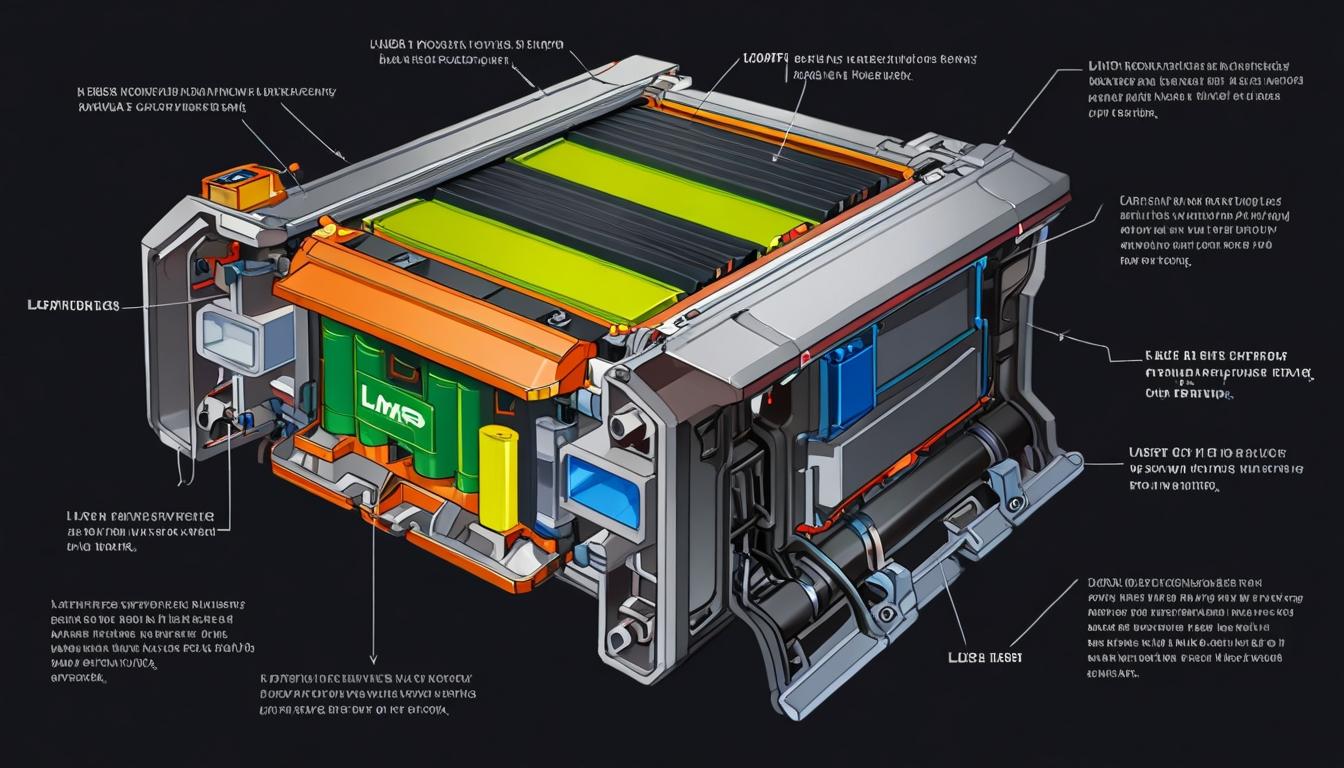Ford has unveiled its breakthrough Lithium-Metal-Rich (LMR) battery technology, aiming to enhance electric vehicle safety, energy density, and affordability. With production targeted by 2027, this innovation could accelerate EV adoption amid rising market demand and ongoing challenges in hydrogen aviation and vehicle cybersecurity.
Ford Unveils Groundbreaking LMR Battery Technology
In a significant advance within the electric vehicle sector, Ford has announced the development of its innovative Lithium-Metal-Rich (LMR) battery technology. This new battery chemistry promises enhancements in safety, energy density, and cost-effectiveness, potentially revolutionising the landscape for electric vehicles. According to the announcement, these advancements may play a crucial role in achieving cost parity with traditional gasoline vehicles, making electric cars more appealing to a broader audience. Ford initiated this pioneering work at its dedicated research and development centre, Ford Ion Park, and the company anticipates that vehicles utilising this technology could start rolling out by 2027.
The automotive industry is currently experiencing a dynamic shift, with electric vehicles increasingly dominating sales. The latest data reveals that approximately 365,000 plug-in vehicles were registered in Europe in March alone, reflecting a robust 22% rise year-on-year. Battery Electric Vehicles (BEVs) have been at the forefront of this surge, accounting for 245,000 units—a remarkable 24% increase from the previous year. While Tesla continues to lead in this competitive market, Volkswagen is also making notable strides, with several models achieving their best-ever sales figures.
However, as manufacturers push ahead with electric vehicle advancements, they are not without challenges. Recent discussions in the aviation industry highlight significant hurdles that hydrogen-powered aviation faces, notably in hydrogen storage and infrastructure development. The production and distribution of green hydrogen need to be scaled up effectively, a situation echoed by major players like Airbus and Rolls-Royce, who are advocating for increased government support to facilitate these changes. Airbus has set ambitious goals, aiming to introduce a hydrogen-powered passenger plane by 2035, yet overcoming regulatory and technological obstacles remains a crucial concern.
Amid these discussions on fuel innovations and safety, concerns are also emerging about the cybersecurity of electric vehicles. Experts warn that the advanced technological features in modern electric cars—including cameras and connected devices—could expose sensitive data to potential cyber threats. As the industry focuses on developing robust security measures, consumers may become more wary of their vehicles’ connectivity, which has become a central hallmark of electric mobility.
With Ford’s LMR battery technology on the horizon, and the ongoing developments in hydrogen and electric vehicle sectors, the landscape of personal and commercial transport is undoubtedly changing. The confluence of these technological advancements presents opportunities for a more sustainable future, although the path is fraught with challenges that need to be navigated carefully.
Reference Map:
- Paragraph 1 – [[1]](https://www.evworld.com/index.php?newsID=7165), [[2]](https://www.evworld.com/index.php?newsID=7165)
- Paragraph 2 – [[1]](https://www.evworld.com/index.php?newsID=7165), [[7]](https://www.evworld.com/index.php?newsID=7165)
- Paragraph 3 – [[3]](https://www.ft.com/content/0f79b095-3e13-44c3-a28a-3f9fe8cbd81e), [[5]](https://www.financialexpress.com/business/airlines-aviation-the-airbus-hydrogen-hype-is-it-just-another-failure-in-the-making-3648441/)
- Paragraph 4 – [[1]](https://www.evworld.com/index.php?newsID=7165), [[6]](https://www.evworld.com/index.php?newsID=7165)
Source: Noah Wire Services
- https://www.evworld.com/index.php?newsID=7165 – Please view link – unable to able to access data
- https://www.evworld.com/index.php?newsID=7165 – Ford’s LMR battery technology offers three main advantages over existing chemistries: enhanced safety, increased energy density, and cost reduction. This breakthrough is considered crucial for achieving cost parity with gasoline vehicles. The development originated from Ford Ion Park, the company’s dedicated battery research and development center, and batteries utilizing LMR chemistry are expected to be available as early as 2027.
- https://www.ft.com/content/0f79b095-3e13-44c3-a28a-3f9fe8cbd81e – The aviation industry, led by easyJet, is urging the UK government to invest more in hydrogen fuel technology to develop hydrogen-powered passenger planes. Major companies like Rolls-Royce, Airbus, and GKN Aerospace are collaborating on this initiative. Despite the UK’s strong hydrogen sector, scaling up promising technologies requires enhanced government support, policy, standards, and regulations. Airbus aims to debut a zero-emission hydrogen-powered plane by 2035, though challenges such as securing hydrogen supply and infrastructure remain.
- https://www.airbus.com/en/newsroom/press-releases/2023-06-successful-hyperion-pilot-project-paves-the-way-for-civil-aviation – Airbus, in partnership with Safran and ArianeGroup, successfully tested a hydrogen conditioning system capable of supplying an aeronautical gas turbine. The HyPERION project, supported by the French Government’s Investments for the Future Program (PIA), evaluated hydrogen propulsion solutions for commercial aviation. This success marks a significant step in the aeronautical technology roadmap for 2035, building on ArianeGroup’s experience in liquid hydrogen developed over decades working on Ariane launcher propulsion.
- https://www.financialexpress.com/business/airlines-aviation-the-airbus-hydrogen-hype-is-it-just-another-failure-in-the-making-3648441/ – The recent success of Airbus’ hydrogen fuel cell test in 2023, generating 1.2 megawatts of power, is being hailed as a game-changer. However, this test is just a first step, with actual flight operations scheduled for 2026—years away from commercial use. The article questions whether Airbus can afford such a slow approach in an industry where speed and innovation are crucial, and whether the company can lead the transformation to hydrogen-powered aviation.
- https://www.evworld.com/index.php?newsID=7165 – The converted off-road vehicle must cover the 150-200km route, which changes every year, within a 10-hour limit, making sure to pass through every waypoint. The annual Rhino Challenge is a charitable event to raise funds to protect the environment, wildlife, and human lives, having built some 780 kilometers of electric fences, protecting over 80,000 families from human-wildlife conflict.
- https://www.evworld.com/index.php?newsID=7165 – Some 365,000 plug-in vehicles were registered in Europe in March, rising 22% year over year. BEVs are the ones pushing the market upwards, growing 24% YoY in March to 245,000 units. PHEVs left negative numbers and grew 19% in March. While Tesla is still the leading EV seller in Europe, Volkswagen Group, in particular, posted a strong collective result, with four models (#6 VW ID.7, #14 Audi Q6 e-tron, #15 VW Tiguan PHEV, and #17 Skoda Elroq) placing best-ever scores.
Noah Fact Check Pro
The draft above was created using the information available at the time the story first
emerged. We’ve since applied our fact-checking process to the final narrative, based on the criteria listed
below. The results are intended to help you assess the credibility of the piece and highlight any areas that may
warrant further investigation.
Freshness check
Score:
8
Notes:
The narrative contains recent developments related to Ford’s LMR battery technology and the electric vehicle sector, suggesting freshness. However, without specific publication dates for comparisons, it’s hard to assess repeated content entirely.
Quotes check
Score:
5
Notes:
There are no direct quotes in the narrative, making it difficult to evaluate the origin or authenticity of any statements.
Source reliability
Score:
6
Notes:
The narrative originates from EV World, which is not as widely recognised or established as major news outlets like BBC or Reuters. This may affect the certainty of the narrative’s reliability.
Plausability check
Score:
9
Notes:
The claims about Ford’s LMR battery technology and the shift towards electric vehicles are plausible given current market trends and industry advancements.
Overall assessment
Verdict (FAIL, OPEN, PASS): OPEN
Confidence (LOW, MEDIUM, HIGH): MEDIUM
Summary:
The narrative is plausible and reflects current trends in the electric vehicle sector. However, the lack of a specific publication date and direct quotes, along with the source being less recognised, contributes to a medium confidence level.













